Big Game Logic is reader-supported. When you buy through links on our site, we may earn an affiliate commission.
The tell tale red waddles moving down the ridge gave me plenty of time to prepare myself for the shot. After just a few yelps on my box call, these toms answered with a series of gobbles and hotfooted right to my field. I shut down the calling as they approached and let their curiosity let the best of them. On this day there would be no hesitation. Five big gobblers surrounded my jake decoy. As the second bird raised his head up in a display of dominance, my hot load of #5's immediately placed him at the bottom of the pecking order.
Those birds were loaded with testosterone and more than willing to respond to just about any call. Once I had their attention, more calling would have just fowled up any chances of filling my tag. But turkey calls are fun and turkey calling is what gets most hunters motivated to roll out of bed at insane hours. While I like my trusty box, many veteran hunters will use several different calls during a hunt. There are a multitude of calls available and they all have their advantages and disadvantages.
Push Button Calls
Often called "idiot boxes," these calls are by far the easiest to learn and use. Most veteran hunters wouldn't be caught dead with one. But with some tuning and a minimum amount of work, anyone can make yelps, purrs, and clucks with push button calls. I'll be the first to admit, I have a push button that I still use.. alot. A lot of manufacturers design them to be attached to the stock of your gun. This allows for easy, one-handed operation.
The only real disadvantage with push button calls, aside from perhaps the embarassment factor, is that they are highly sensitive to rain and even high humidity. Moisture can silence the sweet sounds of the push button call in a hurry.
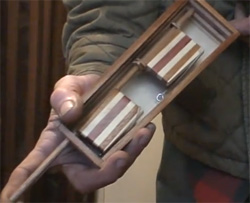
Box Calls
Box calls are also very user friendly, but they are far more versatile. The range of sounds are limitless depending on how you manipulate the paddle while operating the call. In my opinion, a box call is the best long distance call you can use. One of my favorite tricks is to wrap a rubber band around the call and move the paddle slowly. This will make a purring sound that is devastating.
Box calls are traditionally made of wood, so rain can do a number on them. However, some call companies are coming out with weatherproof box calls that sound great. You can make a few sounds with one hand, but generally box calls are two handed instruments. This can be a problem if your hunting in close quarters.
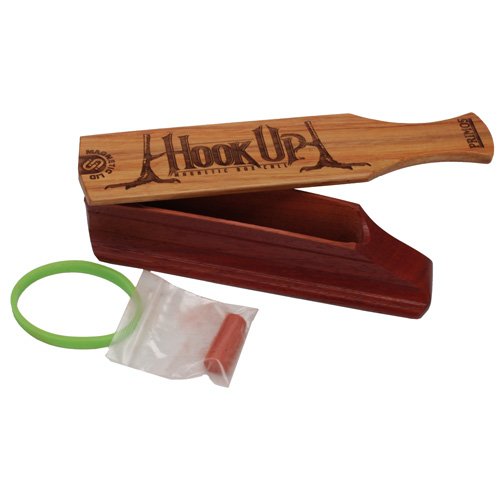
Slate Calls
Slate calls are also known as pot calls. They are round discs of slate, ceramic, glass, or other materials paired with a striker. Strikers can be made of wood, carbon, and other materials. Slate calls take a little more work to learn than box calls, but you can make just about every turkey sound under the sun.
Another advantage to slate calls is that every striker will make a little different sound. Wood and slate pots can be affected by rain and moisture, but ceramic and glass pots are typically weatherproof. The biggest disadvantage to slate calls is that they require two hands to operate.
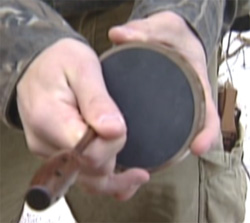
Diaphragm Calls
These are also known as mouth calls. They are the most difficult to learn but easiest to operate once you have mastered them. Diaphragm calls are obviously weatherproof and they offer hands free operation. But the fact that they are hard to learn, impossible for some, makes them a no-go for many hunters. They are worth a try. But if you can’t figure them out, don’t worry. While expert level turkey callers wouldn’t leave the house without them, any of the above calls are just as good at luring big gobblers.
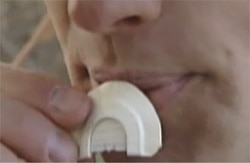
Wing Bone Calls
These are the original turkey calls. Pieces of the wing bone are boiled and the marrow is removed. From there, the pieces are glued together. You can’t buy these in the store! They are very simple to operate. You tighten your lips together and make a kissing type sound. This will produce a yelp. Put three or four of those kisses together to make a series of yelps. You don’t see a lot of people using wing bone calls but it’s fun to use a call you made yourself.
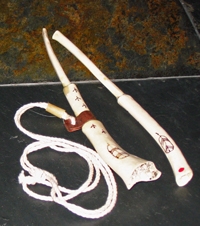
The Camo Glove
This is my favorite turkey call! When turkeys come out of their roost, they are usually hungry. Use your gloves to comb through leaves around you. This will mimic the sound of feeding turkeys and attract birds to your location. It’s not something that will draw birds in from hundreds of yards, but it can help close the deal if you have a bird that is hanging up.

